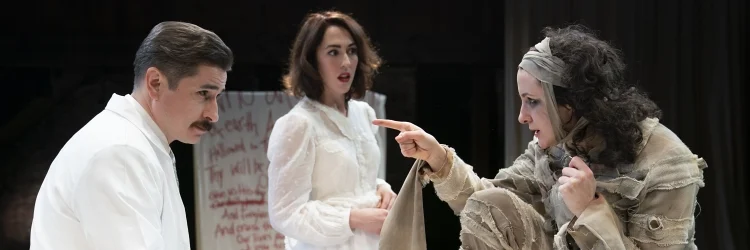Review of Dracula at Classic Stage Company
Over the past few years, playwright Kate Hamill has created something of a cottage industry, writing and acting in feminist stage adaptations of novels like Pride & Prejudice and Little Women. But, until now, she had denied herself the true pleasure of penning a revenge fantasy. Her Dracula, teeming with powerful women and playing in repertory at the Classic Stage Company's Lynn F. Angelson Theater, alongside a much more by the book adaptation of Frankenstein by Tristan Bernays, is biting in every sense of the word, a powerful tale of the overpowering.
Hamill's script operates on several different planes. On one level, it is possible that the whole grisly vampire story is the delusional dream of a madwoman with daddy issues named Rensfield. Locked in an insane asylum, dressed in tatters and giggling like a loon, more often than not she is lurking in the shadows as the narrative unfolds. The meta beauty of this conceit is that Rensfield is played by the playwright. Hamill's delight in being physically surrounded by the work that literally did come from her own mind is palpable and fuels her loose and joyful performance.
The play is also an homage to 1930's movie melodramas. Adam Honoré's lighting design is all sidelights, lanterns and shadows and, as directed by Sarna Lapine, the heroines move with cinematic eloquence while Matthew Saldivar, as the hapless head of the asylum, Doctor Seward, gallops around, tossing off loaded bits of intentionally corny dialog like, "Such stimulation is bad for her condition."
But, most importantly, this Dracula is a corrective in overcoming the gothic tropes of damsels in distress and villains who wear evil on their sleeve. We know the dynamic has shifted early on as Count Dracula (a suave Matthew Amendt) looks up to a bright sky and proclaims, "What a beautiful sunny day." Also, crosses have no effect on him, his mouth is fang-free and his slight Transylvanian accent smacks of wealthy European executive. He is an apparent Everyman who can, parasitically, control those who seek him out. The lessons, as the real world too clearly reflects, are that outward appearances of dangerous men are deceptive, and that "all men could turn dangerous if given too much power."
The women who do battle with the Count are all strong, smart and beautiful. Lucy (Jamie Ann Romero) draws parallels between succumbing to Dracula and succumbing to her potential fate as a housewife, ominously bemoaning that women cannot "stay mad young creatures - forever." Mina (Kelley Curran) the pregnant wife of the once bitten, twice as insufferable Jonathan (Michael Crane) channels her inner vampire killer once she learns what's at stake and Doctor Van Helsing (Jessica Frances Dukes, fierce, fast and furious) leads the way despite her outsider status. Adding atmosphere are the stricken wives of Dracula, Marilla (Lori Laing) and Laura Baranik's Drusilla (a character name borrowed from TV's "Buffy the Vampire Slayer").
With the exception of the badass brown western-wear of Van Helsing, Robert Perdziola's costume design is an inspired blizzard of whites streaked with pools of bloodthirsty red. The former speaks to both purity and madness, while the latter signals rebirth as much as it does vengeance.
(Photo by Joan Marcus)
WHAT THE OTHER CRITICS SAID
"With Dracula, Kate Hamill, an actress and go-to adapter of literary classics, doesn't stint on story or symbolism. The script, which Hamill labels "A bit of a feminist revenge fantasy, really" is fun. Yet it is also fearless, and not in the Cosmo way. Hamill reads Dracula as a tale of toxic masculinity. Her scenes underline the theme with all the subtlety of a highway billboard. Can't a stake be just a stake? At least sometimes?"
Alexis Soloski for New York Times
"Sarna Lapine, who also directed Hamill's Little Women, expertly navigates the script's wild tonal shifts as the production bounces between humor and horror, boosted by clever low-tech effects. (Strings of red beads unspool against Robert Perdziola's all-white costumes whenever blood needs to flow). All of the actors gamely sink their teeth into their parts, but this is the Van Helsing and Mina show, with Seward as their comic foil. Every time he shushes them or calls them hysterical or refuses to address Van Helsing as a doctor, their exasperation incites knowing laughs, especially from women in the audience. Dracula may not be subtle—the dialogue sometimes veers into dogma—but it is satisfying to see these ladies kick ass while rebelling against the subservient roles that so many stories want to cast them in."
Raven Snook for Time Out New York
"Hamill's Dracula sees vampirism as a male club, not unlike the one in "The Stepford Wives," where Count Dracula (Matthew Amendt) recruits other men to join him in his subjugation of women. Doctor Van Helsing, the vampire slayer (Jessica Frances Dukes), is now a feminist on a mission, and asylum inmate Renfield (Hamill herself) has also undergone a sex change. Sarna Lapine, best known for her revival of Sunday in the Park With George starring Jake Gyllenhaal, directs with a broad musical comedy flair. Everyone from Elton John to Frank Wildhorn has tried to set Stoker's story to music and failed on Broadway. With the right songwriter, Hamill and Lapine could have a hit tuner on their hands. Until then, this Dracula has a weird pulse and rhythm all its own."
Robert Hofler for The Wrap
Originally published on
